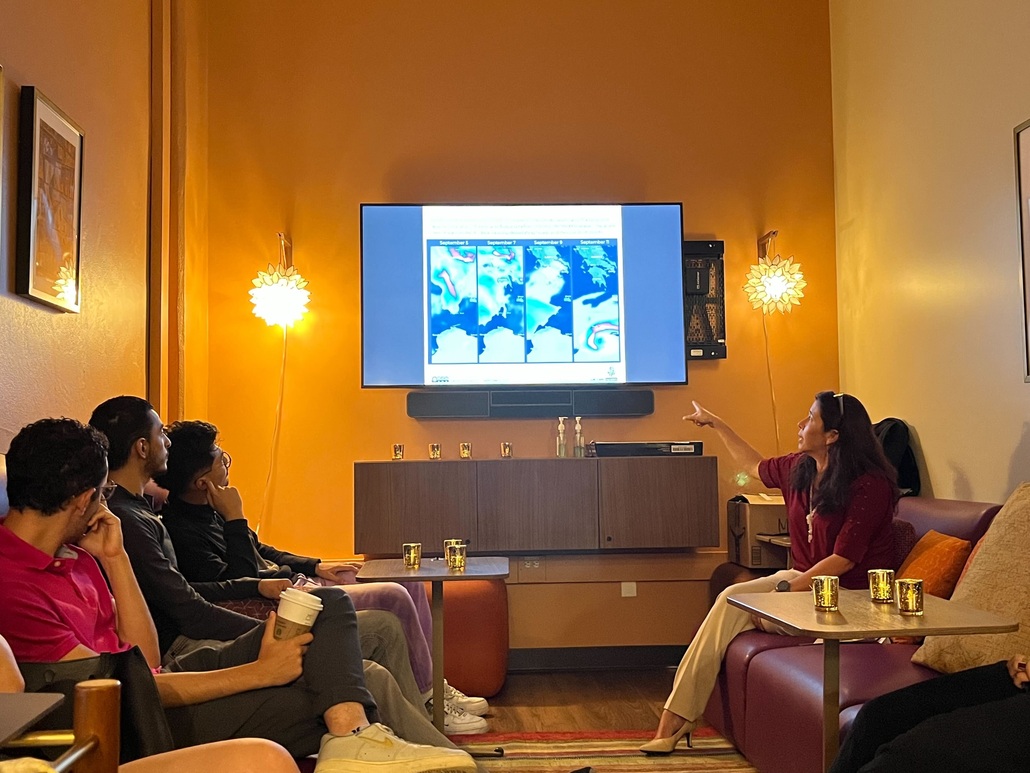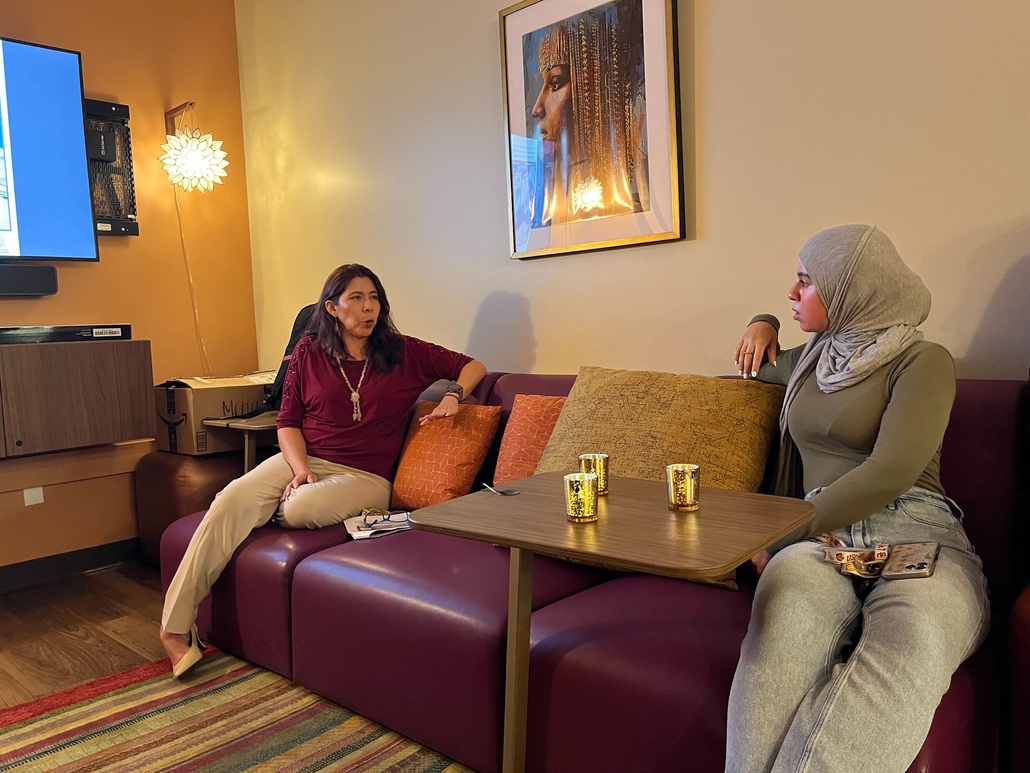Students process, fundraise for North Africa disaster relief
Aid will go toward victims of the Morocco earthquake and Libya flooding.
Aid will go toward victims of the Morocco earthquake and Libya flooding.

Over the past week, members of the Middle Eastern and North African community tabled on the corner of Jefferson Boulevard and Hoover Street and held community meetings to rally support for victims of the Moroccan earthquake and Libyan flood.
Last Friday, a magnitude 6.8 earthquake struck near the city of Marrakech in Morocco, leveling villages and claiming around 3,000 lives. The earthquake was Morocco’s most powerful in more than a century. The following Monday, two dams burst and flooded the city of Derna in Libya during a storm. The flood wiped out a quarter of the city. At the time of publication, at least 11,300 people have died.
Fatima Karami, a senior majoring in mechanical engineering, said her family in Morocco felt the shaking Friday night and rushed outside. Like many others, Karami’s family stayed outdoors for the rest of the night in fear of an aftershock. Being far from her family in the United States, Karami struggled with the uncertainty in the early hours after the earthquake.
“We didn’t sleep that night,” Karami said. “We just stayed over the phone with them, consoling them. And we couldn’t tell [what was happening]. There wasn’t enough coverage of the news at the moment.”
Karami’s family stayed safe, but the outcome for thousands of Moroccans was devastating. The earthquake leveled entire villages and caused widespread death near the earthquake’s epicenter in the High Atlas mountains.
The high death toll is partially attributed to the remoteness of the High Atlas mountains. Most of the houses were constructed from mud bricks, which keep residents cool amid the hot desert but hold little infrastructural weight against an earthquake, said Laura Loyola, an assistant professor of spatial sciences.
“Magnitude wise, there have been larger earthquakes in other places that have not yielded as much disaster,” Loyola said.
In Libya, Storm Daniel brought intense rainfall that triggered the dam failures. The flooding struck at 3 a.m. and brought a 23-foot wave rushing toward the coastal town of Derna. Experts say the intense rain was worsened by the climate crisis, which is intensifying weather events worldwide. In addition to the high death tolls, the flooding left 10,000 people missing and wiped out entire neighborhoods. The flooding cut electricity and communications, and hospitals and morgues are struggling to meet demand.
To further complicate matters, Libya has operated under two rival governments since 2014: the Government of National Stability and the Government of National Unity, recognized by the United Nations, in Libya’s capital city of Tripoli. Each government has its own parliament and prime minister. The lack of communication and collaboration contributed to the devastating effects of the flooding, according to Associated Press reports. Residents said the only warning of danger came from the sound of the dams collapsing.

Last Wednesday, members of the Muslim Student Union sold baklava on the corner of Jefferson and Hoover to raise money for Libyans and Moroccans in need. The sale made $750 in total to split between the Hopiness Foundation — an organization based in the Middle Atlas region in Morocco that typically aids orphans, widows and single mothers — and Islamic Relief, an international aid organization engaged in a wide variety of efforts.
“I believe that my sadness, or sadness in general, is completely useless if we do not turn it into something proactive,” said Assya Aallouche, an undergraduate student studying law whose family operates the Hopiness Foundation. “They do not need our sadness; they need our help.”
The Hopiness foundation was one of the relief organizations that mobilized after the earthquake struck, Aallouche said.
“It was beautiful to see how fast and how efficient the people were,” she said. “As soon as we saw the magnitude of the damages, the team in Morocco gathered volunteers and they directly went to the most secluded regions that had their house completely destroyed. It was fast, it was efficient and [that] was something that we witnessed at the scale of the nation.”
In Libya, groups from around the world joined residents in the daunting task of searching the flooded neighborhoods for survivors. The death toll could potentially double to 20,000 in the coming days as the effects of flooding come into focus and the influx of water potentially spreads disease. Spain, the United Kingdom and the U.S. are among the countries that pledged financial assistance to Libya, while Egypt, Tunisia, the United Arab Emirates and Italy pledged relief teams and supplies.
The Middle Eastern and North African Student Assembly held a meeting Thursday to help the community process and heal. Candles illuminated the MENA lounge as students discussed their feelings about the tragedies and heard from Loyola about the causes of the earthquake and flood.
“Understanding can bring comfort,” Loyola said, “and I think understanding the efforts that can be made to plan better for the future is also important. That’s really what can be looked at from now on.”
The same day as the meeting, MENASA posted a short video to its Instagram account explaining the tragedies and sharing a list of organizations to donate to. MENASA’s executive board is also working to push a resolution through the Undergraduate Student Government to release a statement that will formally acknowledge the tragedies and direct people to aid organizations.
Nour Geha, a junior majoring in international relations, said that statements such as these have a real impact on students.
“You feel like you’re recognized on campus,” she said. “Sometimes I feel like it’s just a phrase that we say, ‘They lost their home,’ but for some people, they lost their home. That’s their life.”
Another group of MENA students held a second bake sale on Jefferson and Hoover for Morocco and Libya Tuesday. The earthquake first struck over two weeks ago, but for these students, the work is far from over.
We are the only independent newspaper here at USC, run at every level by students. That means we aren’t tied down by any other interests but those of readers like you: the students, faculty, staff and South Central residents that together make up the USC community.
Independence is a double-edged sword: We have a unique lens into the University’s actions and policies, and can hold powerful figures accountable when others cannot. But that also means our budget is severely limited. We’re already spread thin as we compensate the writers, photographers, artists, designers and editors whose incredible work you see in our daily paper; as we work to revamp and expand our digital presence, we now have additional staff making podcasts, videos, webpages, our first ever magazine and social media content, who are at risk of being unable to receive the compensation they deserve.
We are therefore indebted to readers like you, who, by supporting us, help keep our paper daily (we are the only remaining college paper on the West Coast that prints every single weekday), independent, free and widely accessible.
Please consider supporting us. Even $1 goes a long way in supporting our work; if you are able, you can also support us with monthly, or even annual, donations. Thank you.
This site uses cookies. By continuing to browse the site, you are agreeing to our use of cookies.
Accept settingsDo Not AcceptWe may request cookies to be set on your device. We use cookies to let us know when you visit our websites, how you interact with us, to enrich your user experience, and to customize your relationship with our website.
Click on the different category headings to find out more. You can also change some of your preferences. Note that blocking some types of cookies may impact your experience on our websites and the services we are able to offer.
These cookies are strictly necessary to provide you with services available through our website and to use some of its features.
Because these cookies are strictly necessary to deliver the website, refusing them will have impact how our site functions. You always can block or delete cookies by changing your browser settings and force blocking all cookies on this website. But this will always prompt you to accept/refuse cookies when revisiting our site.
We fully respect if you want to refuse cookies but to avoid asking you again and again kindly allow us to store a cookie for that. You are free to opt out any time or opt in for other cookies to get a better experience. If you refuse cookies we will remove all set cookies in our domain.
We provide you with a list of stored cookies on your computer in our domain so you can check what we stored. Due to security reasons we are not able to show or modify cookies from other domains. You can check these in your browser security settings.
These cookies collect information that is used either in aggregate form to help us understand how our website is being used or how effective our marketing campaigns are, or to help us customize our website and application for you in order to enhance your experience.
If you do not want that we track your visit to our site you can disable tracking in your browser here:
We also use different external services like Google Webfonts, Google Maps, and external Video providers. Since these providers may collect personal data like your IP address we allow you to block them here. Please be aware that this might heavily reduce the functionality and appearance of our site. Changes will take effect once you reload the page.
Google Webfont Settings:
Google Map Settings:
Google reCaptcha Settings:
Vimeo and Youtube video embeds:
The following cookies are also needed - You can choose if you want to allow them:
